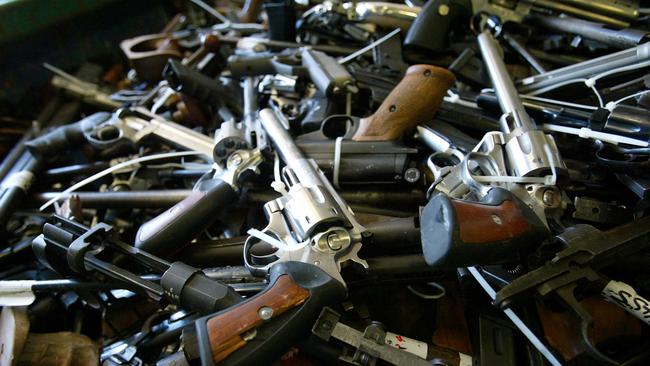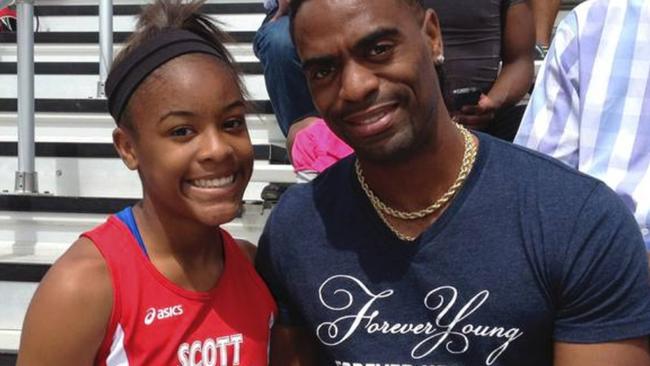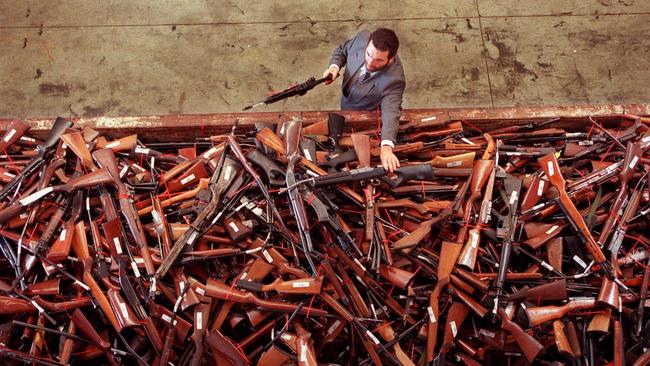Australia’s tough gun laws work. We can’t afford to soften them
Relaxing gun laws in Australia — for whatever political outcomes may be currently desirable — is a terrible idea. People’s fists are dangerous enough.

Rendezview
Don't miss out on the headlines from Rendezview. Followed categories will be added to My News.
If you asked the majority of Australians if they want gun laws to be softened, they would say no. Guarantee it.
But it’s not because we are a bunch of “lefty anti-gun nuts” with an “agenda of personal responsibility for the average citizen”, as a Courier-Mail reader observed after an opinion piece by Senator David Leyonhjelm in April this year (a day before the 20th anniversary commemoration service of the Port Arthur massacre).
And it’s not because, as gun toters have suggested, we are naively comparing ourselves to America — the western capital of mass murder shootings and random loss of life due to gun violence.
Rather, it is because we have seen tougher gun laws work.
And we have seen too many examples overseas where they have not. Just this week 15-year-old Trinity Gay, daughter of US Olympic sprinter Tyson Gay, was shot dead outside a restaurant.
The child, who had ambitions of becoming a surgeon and an athletics champ like her dad, was shot in the neck after being caught in the crossfire of two groups of youths firing at each other from cars in Kentucky.

She didn’t stand a chance.
So don’t tell me that relaxing gun laws in this country — for whatever political outcomes may be currently desirable — is a good idea.
As a parent, I don’t want any more weapons of violence out on the streets when our youngsters go on a night out. People’s fists are dangerous enough.
The stringent regulations boldly and swiftly enacted by then Prime Minister John Howard after madman Martin Bryant murdered 35 innocents in Tasmania in 1996 have served us well.
Some might argue they don’t go far enough.
Senator Leyonhjelm would not be one of them. He claims “law-abiding shooters are still treated like pariahs apart from when they win medals at the Olympics”.
He reckons, in an outlandish comparison, that: “If Muslims, blacks or Jews were treated like gun-owners, there would be outrage.”
Neither collective guilt nor punishment would be tolerated, he says, yet “firearm owners face the impact of collective punishment on a daily basis”.
And here he is again this week, with a right-to-bare-arms Americanised agenda, pushing for an end to an import ban on lever-action shotguns with magazines holding more than five rounds (among other concessions).
For what purpose? To appease farmers who argue it makes shooting feral pests easier?
Senator Leyonhjelm, himself a shooting enthusiast, wants existing bans lifted in exchange for his support of legislation to revive the Australian Building and Construction Commission (a trigger for Malcolm Turnbull’s double-dissolution election this year). Yet, Senate “horsetrading” should never apply to guns.
The 1996 National Firearms Agreement — which includes the banning of automatic and semiautomatic weapons, restricted access to handguns and harsh rules around the purchase and storage of guns — must stay off-limits.

Here’s why: following the agreement’s 12-month national amnesty and government buyback scheme (which led to the melting down of more than 650,000 weapons at a cost of $350 million), rates of homicide, suicide and armed robbery by firearm have all fallen. So have accidental deaths, according to the Australian Bureau of Statistics.
Other research on firearm violence in Australia since 1996, published in the Journal of the American Medical Association in June, provides “hard evidence” on the efficacy of our laws. Simon Chapman, Emeritus Professor in public health at the University of Sydney, led the research and says: “If you take away the means of committing a mass killing with firearms, you don’t have mass killings for the next 20 years.
“People shooting people and their families, their neighbours, their associates, gang members, that sort of thing — all of that is down as well.”
A mass shooting is defined as four or more people shot in one incident. In the 18 years before Port Arthur, Australia had 13 fatal mass shootings.
Since 2013 in the US, there have been 1010 mass shootings, including last weekend at a birthday party in Los Angeles when four people died and 11 were injured.
Democratic presidential nominee Hillary Clinton has hailed our laws as extremely effective in curtailing supply and setting “a different standard for gun purchases”.
We can’t afford to go soft on them.
I am not suggesting, Senator Leyonhjelm, that all people who carry guns are pariahs, or crazed psychopaths in waiting.
But when there is no evidence to suggest that more guns will make our cities and towns safer, why would the majority of Australians want this?
You don’t have to be “anti-gun” to see the sense in sticking with what works.
Kylie Lang is an associate editor at The Courier-Mail


